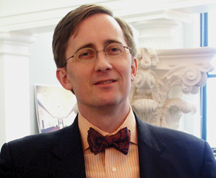
During the early 1990s a few young architectural scholars with radically new ideas began to show up in Notre Dames School of Architecture and to exert a conspicuous influence nationwide.
The new ideas they espoused were really quite old and durable ones, dating as far back as the writings of the ancient Roman architect Vitruvius and recurrent throughout the history of their discipline.Regarded by some colleagues as reactionary and by others as avant-garde, these New Classicists, as they were called, all seemed to agree with Notre Dame architect Thomas Gordon Smith thatthe whole idea of doing something original is so old now.
Their reputation for enthusiastic revival of classical forms inspired a New York Times reporter, Patricia Leigh Brown, to nickname these architects theyoung old fogies,and to call Notre Damedue to their concentration and the curriculum they were developing herethe Athens of the new movement.
Duncan Stroik, associate professor of architecture at Notre Dame, was prominent in this new school whose rebellious adherents wanted to try something old.In the years since 1990, when he joined the Notre Dame faculty, his teaching and scholarship have exemplified his conviction thatjust as to do Catholic theology means to learn from the past, so to design Catholic architecture is to be inspired and even quote from the tradition and the time-tested expressions of church architecture.
To advance this conviction, Stroik serves a director of the Institute for Sacred Architecture, a non-profit organization of architects, clergy, educators and lay people interested in contemporary church architecture.He also edits the insititutesSacred Architecture Journal.
But the conviction is most clearly expressed in Stroiks design work.His portfolio includes numerous civic, residential and collegiate buildings, but his clear preference, even passion, seems to be for church design.Among the projects now on his drafting table are the restoration and renovation of St. Joseph Cathedral in Sioux Falls, S.D.; the renovation of St. Bede Church in Holland, Pa.; the renovation of Sacred Heart Church in Lombard, Ill.; St. Gianna Church and school near St. Louis; and a chapel for the Monastery of San Benedetto in Norcia, Italy.
Quotations from Catholic tradition are particularly abundant in Stroiks recently completed Shrine of Our Lady of Guadalupe in La Crosse, Wis.
I liken the shrine to the great pilgrimage churches of Europe,he says.Whether San Francesco in Assisi, or the Jasna Gora monastery in Poland, such churches are placed on a hill, with prominent tower and dome, and can be seen for miles.
At work on the shrine in La Crosse, Stroik found inspiration in the designs of 16th century Roman churches, particularly of San Giovanni dei Fiorentini, but not long after he had finished, he visited the equally venerable Basilica of Our Lady of Guadalupe.
To my delight,he said,I found that our design was in many ways a daughter of the old basilica, including its interior dimensions, the dome, the use of stained glass and its loftiness.
I had looked a lot at the history of the tilma and its enshrinement in Mexico,Stroik said of the 500-year-old cloak which the old basilica surrounds.On the cloak is the famous icon traditionally believed to have been miraculously imprinted after an apparition of Mary to Saint Juan Diego.
Stroik said that he had that image and Marys coronation as patroness of the Americas in mind as he designed the LaCrosse shrines baldacchino, or canopy-shaped structure above the altar.His baldacchino design alsoquotesfrom a 5th century church, the Basilica of Saint Mary Major in Rome, one of the first great churches built in Marys honor.
Stroik acknowledges that the cruciform, domical church he has designedhas an American and modern and spare feeling to it all, because that is what it is.Nevertheless, he believes that the designis an antidote to most of the recent grand Catholic churches which have generally eschewed traditionand says that he hopes itoffers an example of how to reconnect with tradition.
It is widely agreed that the Shrine of Our Lady of Guadalupe in LaCrosse is the first great Catholic church in the classical style to be built for at least half a century, and Stroik is conspicuously delighted with his role in building it, insisting that itrepresents part of a living tradition, built to be timeless and with beauty and relevance that is ever ancient, ever new.
_ Contact: Professor Stroik at 574-232-1783 or_ " stroik@stroik.com ":mailto:stroik@stroik.com
TopicID: 29527